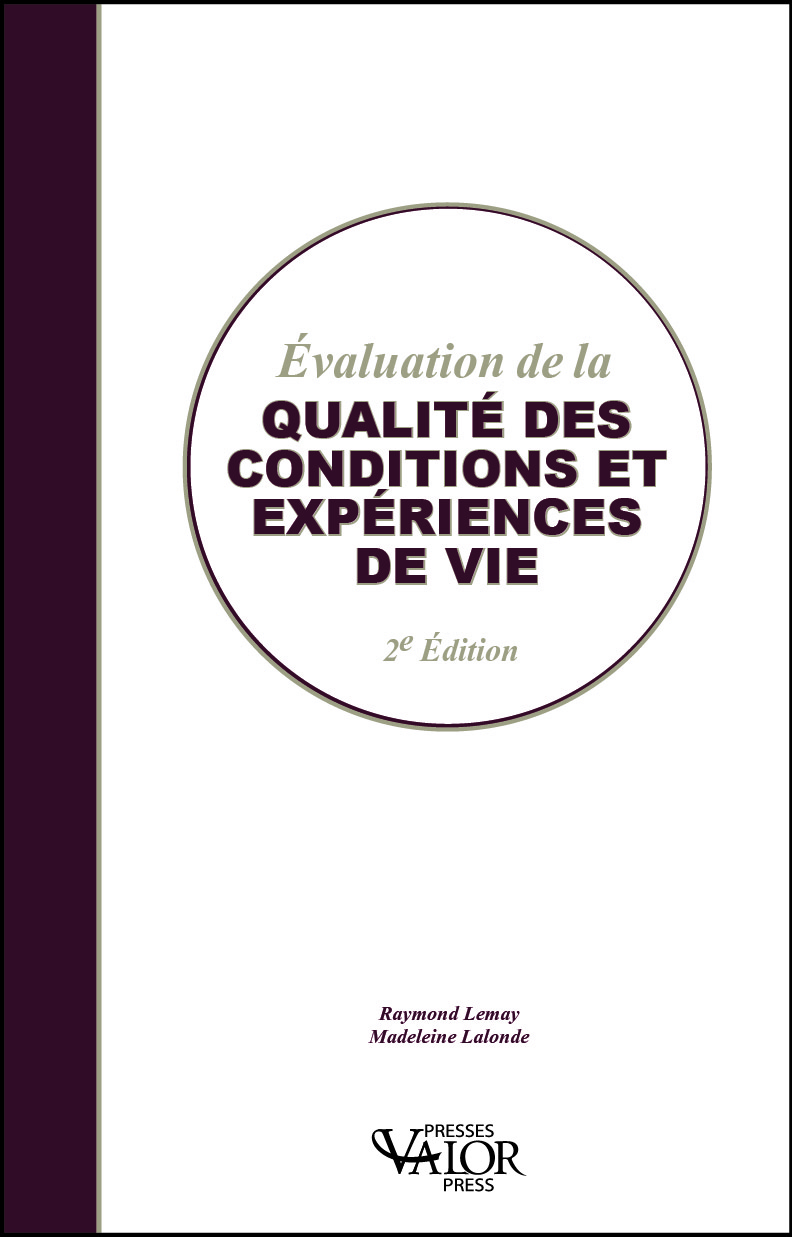
Évaluation de la Qualité des conditions et expériences de vie – QCEV (2e édition)
Ce qui est mesuré attire l’attention et ainsi, l’évaluation de la Qualité des conditions et expériences de vie (QCEV prononcé “ KEV ”) évalue si l’intervention fait une différence réelle et tangible dans la vie des clients d’un service. Le but de l’intervention est de permettre à la personne de mener une vie pleine et de bénéficier des bonnes choses de la vie.
Le QCEV comprend 12 mesures de la qualité des conditions et expériences de vie du client.
Ce livre a été développé par Valoris pour enfants et adultes de Prescott-Russell.
Auteurs : Raymond Lemay & Madeleine Lalonde (2014)
Publié par : Presses Valor Press (Plantagenet ON – Canada)
ISBN : 978-0-9868040-8-3
Droit d’auteur © : 2014, Valor Press
Couverture souple : 78 pages
Dimension : 13.5 x 21 x .5 cm
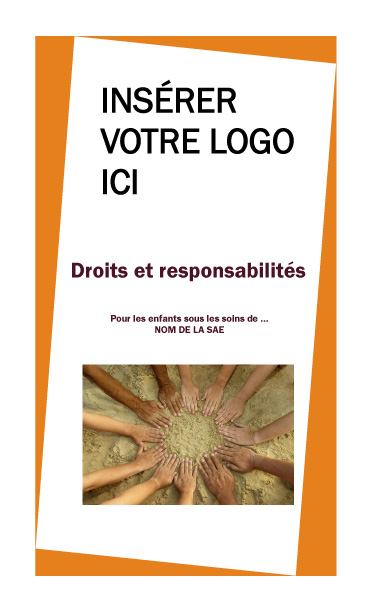
Droits et responsabilités pour enfants
Cet ouvrage de référence a été conçu afin d'enrichir la connaissance des enfants concernant leurs droits et responsabilités. Le manuel est regroupé sous différentes sections dont : les droits des enfants, leurs responsabilités, les décisions qui les concernent, comment demander un examen de placement, insatisfactions et des ressources.
N.B. Cette publication sera imprimée sur mesure pour la Société de l'aide qui le demande, son logo y sera apposé.
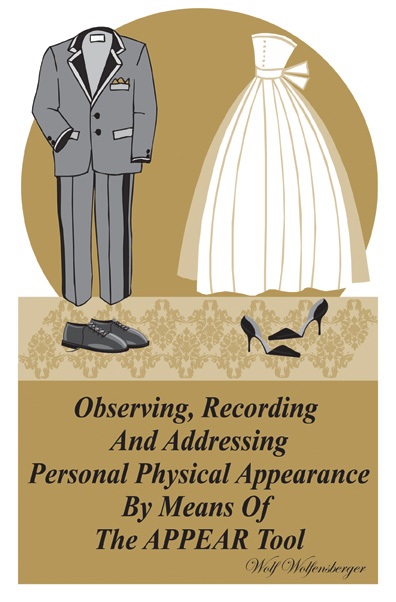
APPEAR: Observing, Recording and Addressing Personal Physical Appearance by Means of the APPEAR Tool
Wolf Wolfensberger (2009)
Personal appearance is one of the most powerful influences on how a person will be perceived and treated by others. The more a person presents a positively valued appearance, the more likely it is that the person will be responded to positively and treated well. But the appearance of many members of societally devalued classes (such as the handicapped, the poor, and members of oppressed minorities) tends to be image degrading.
This 120-page (5 ½ x 8 ½ ) book explains the tremendous importance of appearance, the many components of appearance (dress, grooming, posture, etc.), and strategies which can be adopted to improve appearance features that are negatively valued. The APPEAR checklist identifies elements of appearance that might be improved.
The book also explains how such as appearance review, or audit, would be done. Three checklists are included with the book; sets of 20 APPEAR checklists can be purchased separately. The publication of this book was subsidized by l’Institut Valor Institute, of Plantagenet, Ontario, Canada.
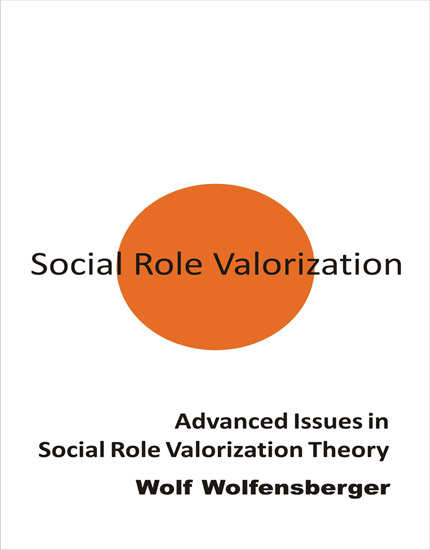
Advanced Issues in Social Role Valorization Theory
About Social Role Valorization (SRV)
Social Role Valorization (SRV), a human service theory based on the principle of normalization, proposes that positively valued social roles are needed for people to attain what Wolfensberger has described as the good things of life (well-being). This is of particular importance for individuals with impairments or otherwise at risk of being socially devalued by others, and therefore of great importance for human services to them.
About the book
The first two chapters explain SRV, and give depth and background to SRV as an empirical theory that is applicable to human services of all kinds, to all sorts of people. The remaining chapters are all revised and expanded versions of presentations that Dr. Wolfensberger had given at previous international SRV conferences. The topics treated in the chapters move from the general (chapters 2, 3, and 4) to the more specific (chapters 5, 6, and 7).
The contents of the book are especially useful for people who do, or want to, teach SRV; for SRV researchers; and for those interested in implementing SRV in a systematic way, especially in service fields where SRV is new, not yet known, and not widely-if at all-embraced.
About Wolf Wolfensberger (1934-2011)
World renowned human service reformer, Professor Wolfensberger (Syracuse University) was involved in the development and dissemination of the principle of normalization and the originator of the program evaluation tools PASS 3 and PASSING, and of a number of service approaches that include SRV and Citizen Advocacy.
This book includes the following chapters
Foreword, by Michael Kendrick
- Preface
- Chapter 1 a brief overview of social role valorization
- Chapter 2 the role of theory in science, and criteria for a definition of social role valorization as an empirically-based theory
- Chapter 3 the hierarchy of propositions of social role valorization, & their empiricality
- Chapter 4 the relationship of social role valorization theory to worldviews and values
- Chapter 5 values issues and other non-empirical issues that are brought into sharp focus by, or at, occasions where social role valorization is taught or implemented
- Chapter 6 issues of change agentry in the teaching, dissemination and implementation of social role valorization
- Chapter 7 the application of social role valorization principles to criminal & other detentive settings
- Conclusion to the book
July 2012

A Quarter-Century of Normalization and Social Role Valorization: Evolution and Impact
Robert J. Flynn and Raymond A. Lemay (1999)
During the late 1960s and 1970s, Normalization and Social Role Valorization (SRV) enabled the widespread emergence of community residential options and then provided the philosophical climate within which educational integration, supported employment, and community participation were able to take firm root.
As dominant influences in the areas of mental retardation and developmental disabilities, Normalization and SRV have also affected practice and policy in mental health and aging.
This book is unique in tracing the evolution and impact of Normalization and SRV over the last quarter-century, with many of the chapter authors personally involved in a still-evolving international movement. Bengt Nirje and Wolf Wolfensberger give detailed first-person accounts of the origins of Normalization in Scandinavia and of its establishment in North America.
Several contributors provide systematic accounts or critical perspectives on Normalization and SRV, while others furnish up-to-date syntheses of research on role theory, residential services, integration, and the Normalization and SRV-based evaluation instruments Program Analysis of Service Systems (PASS) and Program Analysis of Service Systems’Implementation of Normalization Goals (PASSING).
As an appendix, the book also includes a comprehensive 800-item bibliography on Normalization, SRV, PASS and PASSING, covering the period 1969-1999.

A Guideline on protecting the health and lives of patients in hospitals, especially if the patient is a member of a societally devalued class 3rd edition
Announcing : Wolf Wolfensberger’s
A Guideline on Protecting the Health and Lives of Patients in Hospitals,
Especially if the patient is a member of a societally devalued class 3rd edition
“This guide is a practical tool that should be at every hospitalized patient’s bedside. One can only hope that such safeguards will catch on. If patients and their caregivers follow the tips contained in this guide, their hospital stay is more likely to help them recover their health with the fewest possible number of incidents. (from the foreword by André Blanchet, MD).
About the book
“This is a set of guidelines that can be given to a prospective hospital patient, and/or to the person’s family, friends and allies, especially where the patient is a member of a group or class that is societally disadvantaged, or generally held in low esteem. The purpose of the guidelines is to help defend and protect the well being – even the life – of a patient under hospital care. However, this monograph might also be applicable where a person is a patient in other health care settings, such as nursing homes.” (from the introduction, page 7).
About Wolf Wolfensberger (1934-2011)
World renowned human service reformer, Professor Wolfensberger (Syracuse University) was involved in the development and dissemination of the principle of normalization and the originator of the theory of Social Role Valorization (SRV), the program evaluation tools PASS 3 and PASSING, and of a number of service approaches that include Citizen Advocacy.
This book includes the following chapters
- Foreword, by André Blanchet MD, FRCP
- The History of this monograph
- Introduction
- Dangers to Patient Health in Contemporary Hospital Settings
- Special Dangers to Societally Devalued People
- Conceptualizing the Functions of Advocates/Protectors
- Measures to Protect People in Hospitals
- General Considerations
- Measures to Prepare a Patient for Hospitalization or Visits to an Emergency Service
- Advantages and Disadvantages of Different Rooms in a Hospital
- Suggested Guidelines for Carrying Out the Functions of Advocates/Protectors
- Preparing for Hospital Discharge
- Measures to Increase the Effectiveness of an Advocate/Protector
- The Advantages and Disadvantages of Having Prominent People as Advocates
- An Issue of Discretion
- Recruiting Sufficient Advocates/Protectors, and Setting Up Shifts and Logistics
- Conclusion
- References
March 2015
- Author: Wolf Wolfensberger PhD, 1934-2011
- Softcover: 128 pages
- Publisher: Valor Press (Plantagenet ON – Canada)
- Language: English
- ISBN: 978-0-9868040-9-0
- Copyright ©: 2015, Valor Institute
- Product Dimensions: 22 x 16 x 1 cm
- Shipping Weight: 0.25 Kg
- Available: April 2015
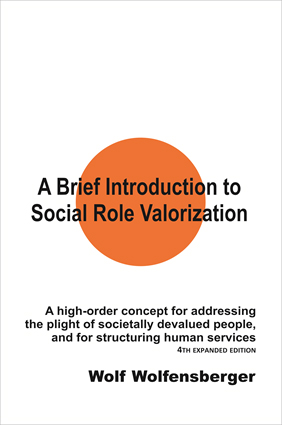
A Brief Introduction to Social Role Valorization - Hardcover
“A long-held rationale of those of us who teach SRV Theory is that the material helps students to see the world from the perspectives of those who receive services and supports, rather than the service provider. Time and again, we hear students describe this as the single most important aspect of taking an SRV Theory course. They … now have new, or different, eyes with which to see … When they changed their perceptions of another person, they then changed their expectations of this person, along with their ideas of what the person actually needs and how to effectively address these needs” (from the foreword by Zana Marie Lutfiyya PhD and Thomas Neuville, PhD).
About the book
This book explains the human service approach of Social Role Valorization or SRV.
“…in order for people to be treated well by others, it is very important that they be seen as occupying valued roles, because otherwise, things are apt to go ill with them. Further, the greater the number of valued roles a person, group or class occupies, or the more valued the roles that such a party occupies, the more likely it is that the party will be accorded those good things of life that others are in a position to accord, or to withhold.
Accordingly, the most recent formal definition of SRV is “the application of what science has to tell us about the defense or upgrading of the socially-perceived value of people’s roles.” Another way to put it is that SRV is a systematic effort to extract empirical knowledge that can be applied in service of the valuation of people’s roles, so that they are more likely to have access to the good life, or the good things of life.” (p. 81).
This version has been expanded from the third (1998) edition of 139 pages to 275 pages.
About Wolf Wolfensberger (1934-2011)
World renowned human service reformer, Professor Wolfensberger (Syracuse University) was involved in the development and dissemination of the principle of normalization, and originated the program evaluation tools PASS and PASSING, and a number of service approaches that include SRV and Citizen Advocacy.
Author: Wolf Wolfensberger PhD, 1934-2011
Publisher: Valor Press (Plantagenet ON – Canada)
Language: English
Copyright ©: 2013, Valor Press
Softcover: 275 pages
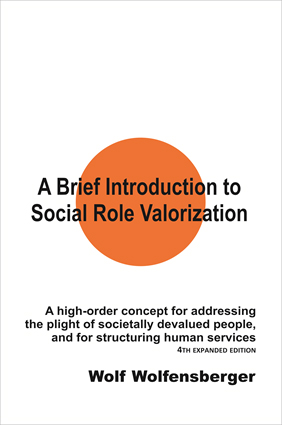
A Brief Introduction to Social Role Valorization
“A long-held rationale of those of us who teach SRV Theory is that the material helps students to see the world from the perspectives of those who receive services and supports, rather than the service provider. Time and again, we hear students describe this as the single most important aspect of taking an SRV Theory course. They … now have new, or different, eyes with which to see … When they changed their perceptions of another person, they then changed their expectations of this person, along with their ideas of what the person actually needs and how to effectively address these needs” (from the foreword by Zana Marie Lutfiyya PhD and Thomas Neuville, PhD).
About the book
This book explains the human service approach of Social Role Valorization or SRV.
“…in order for people to be treated well by others, it is very important that they be seen as occupying valued roles, because otherwise, things are apt to go ill with them. Further, the greater the number of valued roles a person, group or class occupies, or the more valued the roles that such a party occupies, the more likely it is that the party will be accorded those good things of life that others are in a position to accord, or to withhold.
Accordingly, the most recent formal definition of SRV is “the application of what science has to tell us about the defense or upgrading of the socially-perceived value of people’s roles.” Another way to put it is that SRV is a systematic effort to extract empirical knowledge that can be applied in service of the valuation of people’s roles, so that they are more likely to have access to the good life, or the good things of life.” (p. 81).
This version has been expanded from the third (1998) edition of 139 pages to 275 pages.
About Wolf Wolfensberger (1934-2011)
World renowned human service reformer, Professor Wolfensberger (Syracuse University) was involved in the development and dissemination of the principle of normalization, and originated the program evaluation tools PASS and PASSING, and a number of service approaches that include SRV and Citizen Advocacy.
Author: Wolf Wolfensberger PhD, 1934-2011
Publisher: Valor Press (Plantagenet ON – Canada)
Language: English
Copyright ©: 2013, Valor Press
Softcover: 275 pages

